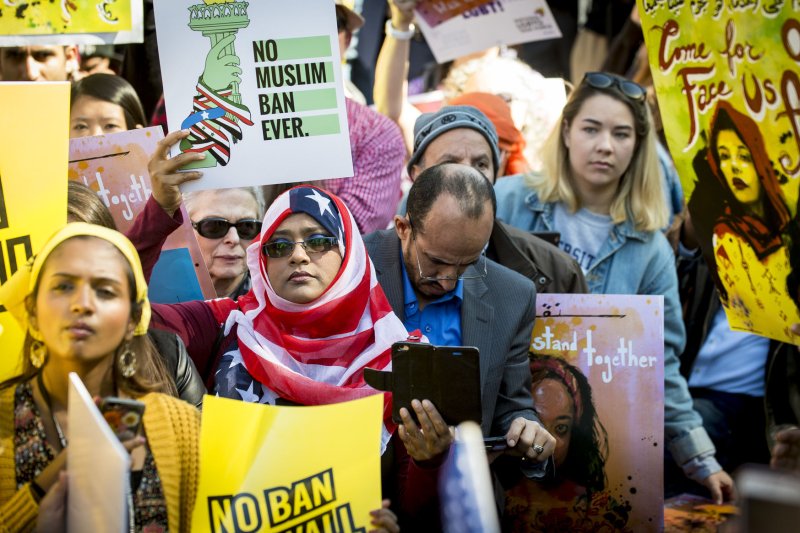
Pro-immigration activists attend a "#NoMuslimBanEver" rally in
front of the White House on October 18. Photo by Pete Marovich/UPI| License Photo
Nov. 2 (UPI) -- President Donald Trump's
announcement that he's "begun the process of terminating the diversity
visa lottery" -- in reaction to Tuesday's New York City terror attack --
has clouded the future of a decades-long staple of U.S. immigration
policy.
Trump immediately indicated he would take action with the program
when it was learned that the New York suspect, Sayfullo Saipov,
emigrated from Uzbekistan to the United States by way of the diversity
visa lottery program in 2010. The president said he would prefer a merit-based program.
The lottery program was created under former President George H.W. Bush
with the Immigration Act of 1990, as a dedicated channel for immigrants
from countries with low rates of immigration to enter the United
States. Under the program,
the United States makes as many as 50,000 visas available each year for
nationals of countries that have sent fewer than 50,000 immigrants to
the United States in the previous five years.
The aim of the program is to diversify the U.S. immigrant population,
and was originally intended to favor immigrants from Ireland. It later
became one of the only avenues for nationals from certain countries to
obtain a green card.
A total of 46,718 visas were issued under the program last year, with 2,378 coming from Uzbekistan. Nearly half of the visas were granted to migrants in Africa.
White House press secretary Sarah Sanders on Wednesday criticized the
"random" element of the selection process for granting immigrants "the
greatest opportunity in the world" to live in the United States.
"To give that away randomly, to have to vetting no system, to have no
way to determine who comes, why they're here, and if they want to
contribute to society, is a problem," she said.
While Sanders acknowledged a merit-based "component" of the program,
she described the lottery as "the lowest level of criteria that any part
of our immigration system has."
Applicants to the program are subject to the same background checks
and screening processes as other immigrant visa applicants, including in-person interviews, document presentation and medical exams.
To be eligible, applicants must have a high-school education or a
minimum of two years working recently in a qualifying profession.
Applicants have until Nov. 22 to submit their applications for fiscal
year 2019. Those who qualify will be placed in a computer-generated
lottery that distributes visas among six geographic regions.
Regions with the lowest rates of immigration receive the greatest
number of visas, and no visas are granted to applicants from countries
that have sent more than 50,000 immigrants to the United States over the
last five years.
The diversity visa program has faced threats in the past, including a
bill proposed by a bipartisan group of senators known as the "Gang of Eight" -- which presented a comprehensive immigration reform bill in 2013 that sought to eliminate the program. The bill ultimately failed.
When News Breaks Out, We Break In. (The 2014 Bloggies Finalist)
No comments:
Post a Comment